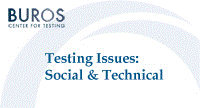Buros-Nebraska Series on Measurement and Testing

Social and Technical Issues in Testing: Implications for Test Construction and Usage
Date of this Version
1984
Document Type
Article
Citation
Published in Social and Technical Issues in Testing: Implications for Test Construction and Usage, edited by Barbara S. Plake (Hillsdale, NJ: Lawrence Erlbaum Associates, 1984).
Abstract
More than any other area, validation research is where the "rubber meets the road" in test construction and test usage. The very term validation implies the assessment or measurement of individuals and the relationship of this assessment to some criterion of performance. The success of a test validation effort, or the lack thereof, has implications for the value of the assessment and for the utility of the procedures.
In today's environment, whether the validation is intended for employee selection, educational decisions, or personal counseling, there is an increasing probability that the outcomes of research will have legal implications. In the past, a testing program could be set up in terms of professional judgment without including the experimental validation of the procedures. If the individuals involved in establishing the test program were knowledgeable, it was quite possible the tests, although unvalidated, would make a practical contribution in terms of the goals intended. In the absence of a formal validation, however, one would never know the extent to which the testing program was successful or superior to another assessment procedure. A testing program that does not involve validation research is at best an unknown and at worst may be an outright fraud. In either case, the likelihood that testing procedures will have to be defended, including the possibility of legal action, has increased dramatically.
The purpose of the present review is to look carefully at the current status and future directions of test validation research. It will be of value to look at what we know, some of the problems with the process by which tests have been validated up to now, what needs to be learned, and how we will move ahead in the area of test validation research. Finally, it will be important to consider test validation research as a vehicle for improving test construction and test usage.


Comments
Copyright © 1984 by Lawrence Erlbaum Associates. Digital edition copyright © 2012 Buros Center for Testing. This book may be downloaded, saved, and printed by an individual for their own use. No part of this book may be re-published, re-posted, or redistributed without written permission of the holder of copyright.